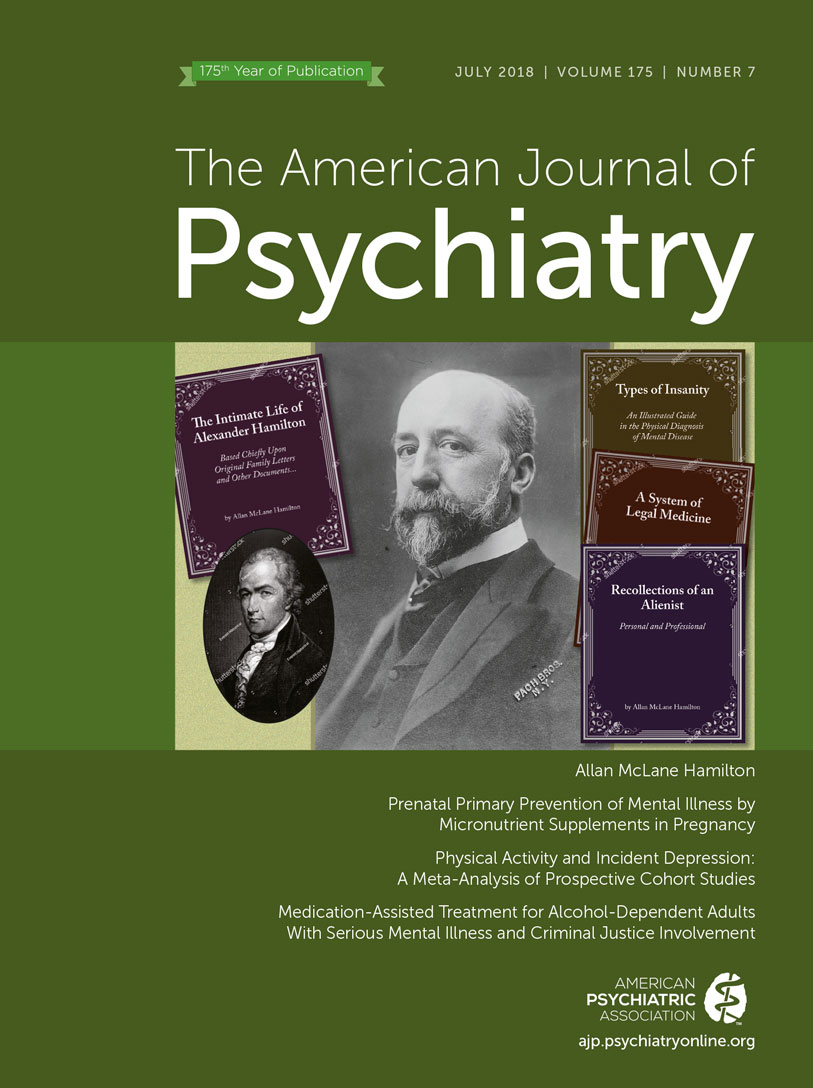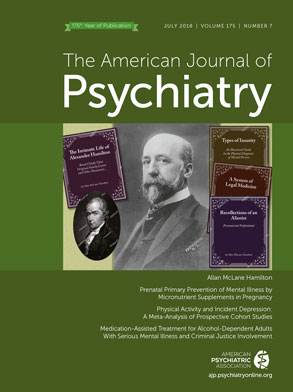Alcohol use disorder is an epidemic in this country and is associated with significant disability, morbidity, and mortality. When alcohol use disorder occurs in patients with serious mental illness, the results can be even more devastating. Patients with severe mental illness and alcohol use disorder often require higher levels of psychiatric care and experience poorer functional outcomes than individuals with serious mental illness alone (
1,
2). Despite the high rates of comorbid mental illness and alcohol use disorder, there is little consensus among experts regarding the most effective treatments for these patients. Conventional psychotherapies that focus on group dynamics and complex interpersonal relationships, such as Alcoholics Anonymous or group therapy, can be overly challenging for patients who experience psychosis or mania at the time that treatment for alcohol use disorder is most needed.
The treatment of patients with serious mental illness and alcohol use disorder is further complicated by the fact that these individuals are significantly overrepresented in the prison population. Data from the U.S. Department of Justice indicates that one-half of all inmates have a mental health problem, and of these individuals, nearly three-quarters also meet criteria for a substance use disorder (
3). Accordingly, the criminal justice system has become one of the major providers of mental health and substance use disorder treatment in the United States. Additionally, the costs of incarcerating individuals with mental illness are higher than for other inmates, because the periods of incarceration tend to be longer and are more likely to require treatment for both medical and mental health issues, including use of psychotropic medications (
3). Individuals with comorbid serious mental illness and alcohol use disorder are also more likely to be reincarcerated than individuals with either mental illness or a substance use disorder alone (
4,
5). Thus, considering the needs of both the individual and society, it is imperative that mental health care providers within the criminal justice system offer optimally effective treatment strategies for both serious mental illness and alcohol use disorder. Studies have suggested that such treatment strategies can improve clinical outcomes and reduce recidivism (
6).
In this issue of the
Journal, Robertson et al. (
7) examine the effects of medication-assisted treatment (MAT) for alcohol use disorder (acamprosate, disulfiram, naltrexone) on long-term mental health treatment utilization and criminal justice outcomes among adults with a history of incarceration who have serious mental illness and alcohol use disorder. The authors found that the use of MAT improved several clinical outcomes. More specifically, individuals receiving MAT showed better adherence to their psychotropic medications, a reduction in visits to emergency departments, and a reduction in psychiatric hospitalizations during the subsequent 12 months.
There are several reasons why this study is remarkable. First, it provides much-needed evidence to support MAT as an evidence-based therapy for incarcerated individuals with both serious mental illness and alcohol use disorder. Thus far, systematic research on the effectiveness of even common treatments for mental illness among incarcerated individuals is significantly underrepresented in the literature. More importantly, the outcomes assessed by Robertson et al. are of clear clinical importance and intuitively linked to the individual’s ability to survive and thrive in the community. Robertson et al. also demonstrate that use of effective treatments for alcohol use disorder can improve criminal justice outcomes and therefore reduce the burden of alcohol use disorder on our health care system and on communities as a whole. While MAT did not reduce recidivism overall in this study, it was associated with reduced felony convictions among adults with bipolar disorder. The authors plausibly speculate that the lack of a more general effect on recidivism in this population may be due to increased probation rates, greater legal scrutiny, and the complex causes of criminal offenses. Improved mental health outcomes may ultimately reduce barriers to further treatment, improve access to prevention interventions, and even reduce the risk of individuals entering the criminal justice system in the first place.
This study is also notable in that it compared MAT with other forms of treatment for alcohol use disorder. The results of the study strongly suggest that adding MAT to nonpharmacological therapies can improve clinical outcomes among individuals with both serious mental illness and alcohol use disorder. Thus, the results of this study move us toward the recognition that MAT, in combination with other multidisciplinary approaches, should be the standard of care.
Of course, this study is not without some limitations, as recognized by the authors. The study was not designed prospectively as a randomized, controlled trial of the effectiveness of MAT. However, the retrospective approach taken by the authors allowed them to benefit from a very large sample size. Furthermore, the investigators attempted to link substance abuse treatment with improved criminal justice outcomes, which may be an oversimplification of the causes of crime. The reasons individuals commit criminal offenses are many, and mental illness and substance use exert their influences, along with a variety of other psychosocial determinants. Nonetheless, individuals within the criminal justice system who have serious mental illness and alcohol use disorder deserve evidence-based treatments, and progress in this area can not only improve individual clinical outcomes but also reduce systemic burdens.
As providers, we should acknowledge several points demonstrated by the results of this study. First, MAT, currently underutilized as a treatment for alcohol use disorder, is feasible for incarcerated individuals. Second, MAT appears to be more effective than nonpharmacologic treatments alone for alcohol use disorder, and, as such, the combination of MAT and nonpharmacological treatments should be considered a preferred treatment. Third, MAT for incarcerated patients with both serious mental illness and alcohol use disorder may reduce the likelihood of at least some forms of future crime.
Because MAT is now demonstrated to be both safe and effective, the study by Robertson et al. leaves us with a compelling rationale for offering MAT as the standard approach to treating comorbid serious mental illness and alcohol use disorder for individuals within the criminal justice system.

